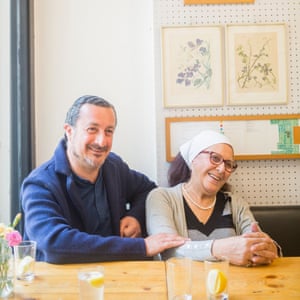by Melissa Nann Burke, Detroit News Washington Bureau Washington — John Akouri, president and CEO of the Lebanese American Chamber of Commerce in Royal Oak, is under consideration as the next ambassador to Lebanon, according to reports. Akouri is a former city councilman in Farmington Hills and a GOP strategist who co-chaired President Donald Trump’s […]
This article represents only the opinion of the author BEIRUT, May 25 (Xinhua) — Hezbollah chief Sayyed Hassan Nasrallah launched a verbal attack Thursday on Saudi Arabia and the Riyadh summit, accusing it of being behind all the terrorist activities that are targeting the countries of the region and the world. In a televised speech to […]
by catholicherald.co.uk – The US president said it was a ‘very great honour’ to meet the Pope Pope Francis and US President Donald Trump spent 30 minutes speaking privately in the library of the Apostolic Palace May 24, and as the president left, he told the Pope, “I won’t forget what you said.” The […]

.- When U.S. President Donald Trump stops in Rome for a meeting with Pope Francis Wednesday, both his wife Melania and daughter Ivanka will have their own schedules, which include stops at a Vatican hospital and a round-table on human trafficking. Ivanka serves in her father’s administration in an unpaid position as an assistant to the president. Pope Francis and Donald Trump will meet at the Vatican May 24 at 8:30 a.m., before the Pope’s General Audience. Melania and Ivanka will both be present for the public portion of the visit, but will each follow their own itinerary after.Once the meeting is finished, the First Lady will a visit the Vatican-owned pediatric hospital Bambino Gesu. During her tour of the facility, Melania is expected to greet patients and visit one of their playrooms as well as the chapel. While Melania visits Bambino Gesu, Ivanka, a high-profile adviser to her father, will make her way to the Roman neighborhood of Trastevere to meet with the Community of Sant’Egidio to discuss efforts to oppose human trafficking.
The Sant’Egidio Community is often praised by Pope Francis for their work, in particular for the projects they lead aimed at helping the poor and refugees. During her meeting with Sant’Egidio, Ivanka is expected to meet with several women who are victims of trafficking, and discuss various ways in which the Church and the U.S. government can collaborate on the problem. Before leaving with her father on his first international tour, Ivanka hosted an anti-human trafficking round-table at the White House May 17 that hosted a swath of bipartisan lawmakers and representatives of numerous organizations that deal with human trafficking. According to reports, during the discussion Ivanka spoke about the Trump administration’s efforts to combat trafficking not only in the U.S., but throughout the world, telling attendees that “combatting human trafficking and modern slavery is both a moral and strategic interest domestically and abroad.”
by Aoibheann O’Sullivan
The unit of six UNIFIL French peacekeepers, carrying a stretcher with a colleague strapped to it, turned the corner and saw the menacing lattice of ropes about 50 cm off the ground glinting in the afternoon light. They hardly broke their pace as they yelled instructions to each other, and then leopard-crawled at haste under the web of ropes, dragging their stretcher-bound teammate with them. The crowd watching roared in appreciation. Close on their heels were teams from the Lebanese Armed Forces, UNIFIL Malaysia, Ghana and Republic of Korea contingents. The dust kicked up by the competition caught the evening sun as it no doubt used to during Roman times when chariots entertained the crowds.The archaeological Roman hippodrome in the Lebanese city of Tyre is one of the largest and best preserved hippodrome in the world. The site once seated around 20,000 spectators and hosted dramatic chariot races. Last Sunday, this ancient site was a fitting backdrop for the annual Military Olympiad between UNIFIL and the Lebanese Armed Forces (LAF).
As teams of Lebanese military personnel and UNIFIL peacekeepers sweated it out in friendly, but gruelling competitions, Brigadier General Liot de Nortbecourt, UNIFIL Chief of Staff, contextualised the event, “The reason we’re here today is to support two associations that take care of wounded soldiers, their families and children of martyrs. The first one is a French association based in Paris ‘Terre Fraternité’ and the second association ‘Association of the Martyr Lt Col Sobhi Al Akoury’ is named after the first LAF martyr in Nahr al-Bared battles and it protects and supports the families and children of these Lebanese Army martyrs.” Each association received a donation of US$ 23,000, but not before military personnel had to compete in boot-camp style events. These included “Chronos”, where teams of 10 personnel race to pull a 6,100-kg truck for 150 metres, and the appropriately named “Hades”, where teams of seven each had to do a rugged cross fit relay circuit.
by Rania Ghanem The 2016 average room rate in Beirut hotels was the same level as that in 1996, which was $166. Significant changes however had been registered over the years with rates reaching their peak of $281 in 2009. Both figures were stated in the recent report: ‘2017 Middle East hotel survey – Chaos […]
by Naharnet U.S. President Donald Trump compared Hizbullah in a landmark speech on Sunday to extremist organizations such as Islamic State and al-Qaida, as he lauded the Lebanese army for fighting IS and Lebanon for hosting a huge number of Syrian refugees. “We now face a humanitarian and security disaster in this region that is […]

by Wendell Steavenson- The guardian
Kamal Mouzawak grew up in Jeita, a small town in the mountains north of Beirut, during the Lebanese civil war. One of his earliest memories was when his mother was out of the kitchen and he decided to make a cake. He thought to himself: ‘What is a cake?’ He stirred a slurry of flour, sugar and eggs in an empty sardine tin because he could not find a cake pan and cooked it on top of the stove. “It was a burnt omelette!” he laughed, remembering the experiment over lunch this spring in Beirut. “But what still amazes me is the metamorphosis of ingredients.” Over the last decade, Mouzawak has created a recipe for transforming people’s lives through food. He now presides over a network of markets, restaurants, bed-and-breakfasts and community outreach programmes in Lebanon.
Some projects are non-profit, others for-profit, and through them Mouzawak has developed a model of social entrepreneurship that is as much about empowering people as selling products. His brings together farmers, chefs, NGOs, designers and artisans, connecting people to politicians and business to ethics. One morning, in his main restaurant in Beirut, I watched him conduct three business meetings simultaneously, moving from table to table, discussing photographs for a new cookbook, plans for a new restaurant and giving a quick briefing to a group of European journalists on a tour. His enterprise is called Souk el Tayeb. Souk is Arabic for market and tayeb is a useful word with several meanings, including good, kind, delicious. It signifies acceptance, acknowledgement and thank you all rolled into one. Souk el Tayeb began as a farmers’ market in 2004.
I lived in Beirut when the market first opened on a scratched patch of car park, one of the bald spots in a city destroyed by 15 years of civil war. It sold orange blossom honey from the citrus orchards in the south, thick dark pomegranate molasses made by a grandmother in a mountain village, jars of pickled radishes, cucumbers, peppers; feta cheese preserved in oil with thyme and chillies. The sambousek stuffed with ground lamb and spinach always sold out within the first hour. Fresh fruit from across Lebanon at the Souk el Tayeb farmers’ market in Beirut. Facebook Twitter Pinterest Fresh fruit from across Lebanon at the Souk el Tayeb farmers’ market in Beirut. Photograph: Natalie Naccache for the Observer The market is still one of the great wonders of the Middle East. I walked along the rows of stalls one recent sunny spring Saturday morning, marvelling, wide-eyed and hungry.

By Jordyn Phelps & RYAN STRUYK ABC news
President Trump signed a $110 billion arms deal with Saudi Arabia on Saturday, the initial day of his first foreign trip since taking office. “That was a tremendous day. Tremendous investments in the United States,” Trump said. “Hundreds of billions of dollars of investments into the United States and jobs, jobs, jobs,” he said. The agreement commits Saudi Arabia to buying military equipment from the U.S. and to hiring American companies to build such equipment in Saudi Arabia, according to Gary Cohn, the president’s chief economic adviser. The deal includes tanks and helicopters for border security, ships for coastal security, intelligence-gathering aircraft, a missile-defense radar system and cybersecurity tools, according to the State Department.
In a joint press appearance on Saturday with the Saudi foreign minister, Secretary of State Rex Tillerson praised the pact as a “historic moment in U.S.-Saudi relations.” He also expressed an openness to talks with Iran. “I’ve never shut off the phone to anyone that wants to talk or have a productive conversation,” he said. “At this point, I have no plans to call my counterpart in Iran, although in all likelihood we will talk at the right time.”. Tillerson said the pact sends a “very strong message to our common enemies” on trying to disrupt “violent extremist messaging” and “financing of terrorism.” He also said the deal “lowers the cost to the American people of providing security in this region.”
The Trump administration has been working to finalize the deal over the past several months. White House press secretary Sean Spicer called the deal “huge news for U.S. companies and American workers who will benefit” in a tweet on Saturday morning. This is huge news for US companies and American workers who will benefit #jobs https://t.co/9RarqOwVAy — Sean Spicer (@PressSec) May 20, 2017
Trump’s son-in-law and adviser Jared Kushner personally called the president of Lockheed Martin, a major supplier of U.S. military equipment, in order to negotiate a lower price for the radar system, according to the New York Times. “This package of defense equipment and services supports the long-term security of Saudi Arabia and the Gulf region in the face of malign Iranian influence and Iranian related threats. Additionally, it bolsters the Kingdom’s ability to provide for its own security and continue contributing to counterterrorism operations across the region, reducing the burden on U.S. military forces,” the State Department said in a statement. A White House official added that in addition to demonstrating the U.S. commitment to Saudi Arabia “and our Gulf partners,” it also expands “opportunities for American companies in the region, and supporting tens of thousands of new jobs in the U.S. defense industrial base.”
by ABC news Alexander Mallin and Adam Kelsey –
President Trump on his first foreign trip has arrived at the Royal Court Palace in Saudi Arabia where he will begin a full day of meetings with the country’s royalty. The president was greeted by King Salman and honored with an elaborate red carpet ceremony. A Saudi military band then played the Star-Spangled Banner. The White House staff with the president — Ivanka Trump, Jared Kushner, Steve Bannon, Reince Priebus, Joe Hagin, Hope Hicks, Dan Scavino, Sean Spicer and Dina Powell — all shook hands with Trump and King Salman as they arrived. Trump was also presented with the Collar of Abdulaziz Al Saud, the Saudi nation’s highest honor. After the award was bestowed, the president and king spoke briefly. Their conversation at one point touched on Syria, with King Salman heard noting that the now war-torn country used to be an advanced nation and pondering how quickly a country can be destroyed.
“Syria too used to be one of the most advanced countries,” the king said. “We used to get our professors from Syria. They served our kingdom. Unfortunately, they too brought destruction to their own country. You could destroy a country in mere seconds, but it takes a lot of effort.” President Donald Trump arrived in the Saudi Arabian capital of Riyadh Saturday morning, marking the kick-off of his first foreign trip as president.


The ceremony at the palace came after the president and first lady Melania Trump landed at King Khalid International Airport around 9:45 a.m. local time after an overnight flight from Washington on Air Force One.The Trumps descended down a set of stairs from the plane onto a red carpet, where they were greeted by King Salman. Ivanka Trump and husband Jared Trump exited the jet from the back steps, prior to the president. Ivanka wore an ankle-length dresss

At the airport, King Salman joined the president for a walk down a red carpet, with the Saudi Royal Guard lined up at attention along either side with trumpets playing. Jets also flew overhead, leaving behind a stream of smoke in red, white and blue. The first lady followed behind, dressed in a flowing black jumpsuit and a gold belt.The president and first lady then walked into the terminal where a coffee reception with King Salman was held. The pair spoke through an interpreter inside the terminal, according to The Associated Press.




